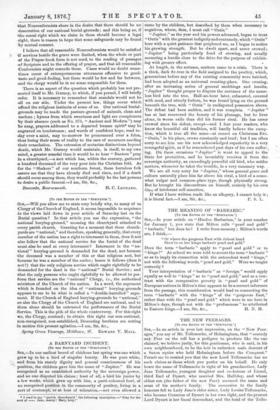[TO THE EDITOR OF THE " SPECTATOR:1
you allow me to state very briefly why, to many of us Clergy of the Church of England, it seems impossible to acquiesce in the views laid down in your article of Saturday last on the Burial question? In that article you use the expression, "the stational burying-ground," meaning the churchyard attached to .every parish church. Granting for a moment that these church- yards are "national," and therefore, speaking generally, that every member of the nation has a right to interment in them, does it not also follow that the national service for the burial of the dead must also be used at every interment? Interment in the "na- tional" burying-ground is demanded for the dead, not because the deceased was a member of this or that religious sect, but because he was a member of the nation; hence it follows (does it not?) that the only religious service which ought rightfully to be demanded for the dead is the "national" Burial Service ; and that the only persons who ought rightfully to be allowed to per- form that service are the "national" Clergy, i.e., the authorised ministers of the Church of the nation. In a word, the argument which is founded on the idea of " national " burying-grounds appears to me to be what is called a "double-barrelled" argu- ment. If the Church of England burying-grounds be "national," so also the Clergy of the Church of England are national, and to them alone should be entrusted the performance of the Burial Service. This is the pith of the whole controversy. For this right we, the Clergy, contend ; to obtain this right our non-national, non-recognised, non-established, Dissenting brethren are setting in motion this present agitation.—! am, Sir, &c.,
Spring Grove Vicarage, Middlesex, W. EDWARD V. HALL.


































 Previous page
Previous page